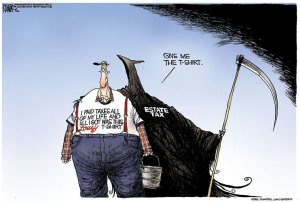The Federal tax code of the US is complicated, >70,000 pages at last count (Trump thinks it is 700,000). After having briefly fully repealed their estate tax in 2010 the US re-instated, retroactively in 2011. The top Federal bracket is 40% for estates >$1mm. The exemption was set at $5mm which is indexed to inflation (standing at $5.43mm for 2015). Because of the high level of the exemption for Americans ($10.86mm per couple), only 0.12% of taxpayers (1 in 833 on passing) pay Federal estate taxes. In 2014, the IRS collected $17.5bln in Estate Taxes, less than 1% of total tax receipts which eclipse $3tln.
Foreigners (non-residents, also known as non-resident aliens for tax purposes) are often ensnared unknowingly in USAs “Death Tax” as it is widely known, as the exemption is a paltry $60,000 of US situs (the place to which for purposes of legal jurisdiction or taxation a property belongs) assets. Relief is available to those residing in countries with dual taxation treaties with the US, where in many cases an exemption equivalent to American levels are granted (albeit on a US situs to non US situs asset ratio in some cases).
What follows are some practical and legal solutions for the rest of us (non Americans without tax treaty benefits), naked of cover and massively long the global reserve currency US$. As always, please consult a professional in estate planning matters, as the sands are always shifting with respect to global tax policy.
Jack Bogle, as a supporter of passive indexing does not see the value of Financial Advisors (FAs) as being their stock picking acumen. To Jacks mind, FAs should be utilized to marshal the best advice with respect to tax efficiency, risk management, estate planning and owning the appropriate amount of insurance. The inherently unfair thing about estate taxes is that the amount of estate tax paid depends on the quality of the estate planning advice received.
Minimize U.S. Situs Assets:
The rules on what constitute U.S. Situs assets are peculiar. US$ cash held is a Bank is not US situs and hence not subject to estate taxes. US$ cash held with a Broker-Dealer is US situs and subject to estate tax, making the home for both your emergency fund and the cash component of your investment portfolio clear. Put your US$ cash in the Bank. Tangible property (cash/collectibles) held in a US safe deposit box are US situs and subject to estate tax.
Equity investments (shares of stock) in a US Corporation are US situs, subject to US estate taxes. The largest investment houses such as Vanguard and Blackrock (i-Shares) have a ready made work around for those fond of garnering their equity exposure via low cost ETFs. The issuing domicile of the ETF determines the situs for estate tax purposes. Vanguard’s London Stock Exchange (LSE) listed S&P 500 ETF, VUSD is over $12bln in size and trades 1mm + shares per day. My favourite ETF is iShares IWDA, also LSE listed, which tracks the MSCI World Index of 23 developed markets (57% US weighted) with 1643 constituents. The added benefit of iShares IWDA is the dividends accumulate instead of attracting withholding taxes (wht). Foreign stocks listed on US exchanges (ADRs) owned by a non-resident are not subject to US estate tax.
US Treasuries are not subject to wht and are not deemed to be U.S. Situs for estate tax purposes.
Real assets – Real estate is US situs and subject to estate taxes. If it forms a large part of your estate putting a non-recourse mortgage on the property might make sense. I’d rent my clothes if I could …..just saying.
U.S. Qualified Domestic Trust (“QDOT”):
Setting up a trust is another solution which effectively defers US estate tax until other solutions arise (i.e. spend it, gift it, anything but pay it to Uncle Sam blindly). The cost, from a reputable provider, is less than most assume. This often packaged with a will, an irrevocable life insurance trust (ILIT) and a healthcare directive, all good things to address while we are healthy and mentally sharp.
Insurance:
Term life insurance, to cover the unforeseen, is a good idea. Someone in good health in their 40’s can purchase $1mm of 15-20 year term for approx. $800-$1200 per annum. Structured properly, in concert with the above noted life insurance trust, the life insurance payout is both tax free and avoids probate.
Retirement accounts:
These assets pass to heirs via beneficiary forms so ensure your primary and secondary beneficiaries have been properly assigned.
Summary:
It is not just seaweed that gets you to the ripe old age of 86 with aspirations of 114, financial peace of mind for you and yours counts for a lot too. JCG
Note: mm denotes million
If you enjoy the content at iBankCoin, please follow us on Twitter





good read